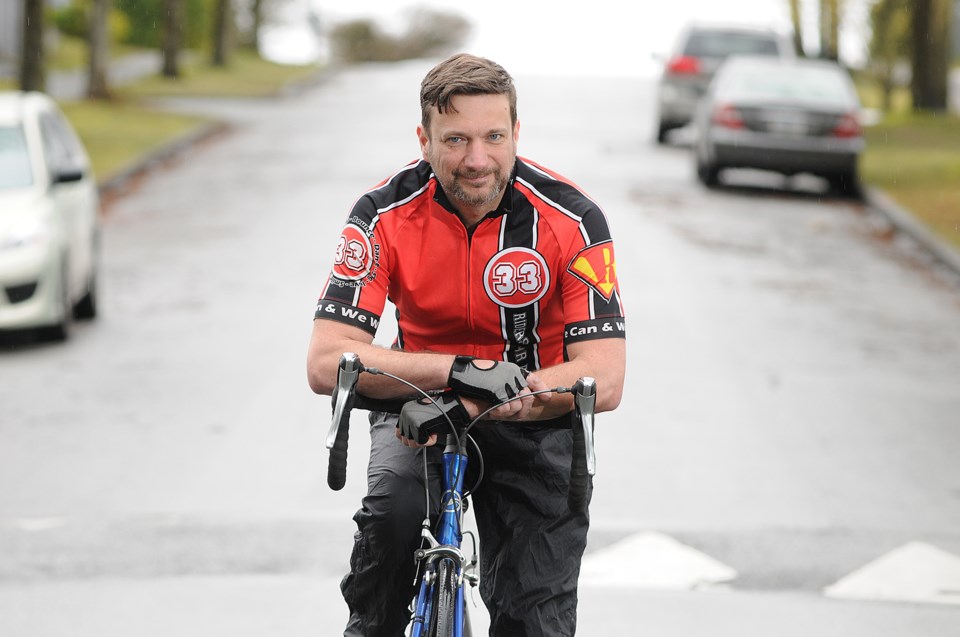Forty-one initially seemed like a great age for Terry Firestein. He was busy with a new home, two sons and his dream job running a small body shop that restored British cars. Then his father was diagnosed with lung cancer and died within three weeks.
Firestein chalked up his own concurrent aches to circumstances. But when the pain persevered, he had x-rays and blood tests, was diagnosed with arthritis and prescribed anti-inflammatories. Followup blood tests revealed he was losing blood and anemic. Seven months after his father’s death from cancer, Firestein learned he had colon cancer.
“It was a total shock... Colon cancer did run in my family but all my family members that had colon cancer were all in their 70s and 80s and my dad used to get regular colonoscopies,” Firestein said. “What they told me with my sons is they should be checked at 10 years before I was diagnosed, so they’ll have to go in when they’re 30. But going off that, I should have been good ‘til I was 60 years old before I needed checks.”
Surgeons removed half of Firestein’s colon and 12 inches of his small intestine. Cancer had spread to five of his lymph nodes, so he underwent six months of chemotherapy to help prevent a reoccurence.
The first chemotherapy cocktail provoked a heart attack. He completed six months of chemotherapy treatment with a different mix.
All was relatively well until October 2009 when doctors discovered eight tumours on Firestein’s liver.
Surgery wasn’t advised so he resumed chemotherapy.
“It was pretty nasty that time around,” Firestein said. An oncologist recommended an experimental drug called Avastin, which stops the body from producing blood vessels. Firestein believes that drug made the difference.
He received a clear scan in December 2010 and participated as soon as he could in the fundraising Ride to Conquer Cancer for the B.C. Cancer Foundation in 2012. He plans to ride for the third time June 14 and 15.
Firestein is sharing his story during National Colorectal Cancer Awareness Month to encourage others to participate in the ride and donate to the foundation, the fundraising partner of the B.C. Cancer Agency and the largest charitable funder of cancer research in the province.
“People always tell me that I inspire them or whatever and it would be nice to let people know that there is hope out there and things are getting better,” Firestein said. “Cancer rates are increasing but also survival rates are increasing and I firmly believe that it’s through all the fundraising they do and the research and I guess for people don’t give up hope and we’ve got to continue searching for answers.”
Age is the most important risk factor for colon cancer. Dr. Hagen Kennecke, a medical oncologist and professional practice leader of medical oncology at the B.C. Cancer Agency, says colorectal cancer typically appears when people reach their 60s or 70s.
The B.C. Cancer Agency recommends everyone aged 50 to 74 be screened for colon cancer because it provides few symptoms and the survival rate for colon cancer detected at its earliest stage is over 90 per cent. One symptom of colon cancer is blood in stool. Those with a parent or sibling with colon cancer should be screened earlier.
High-fibre diets that are low in fat and red meat have been linked to lower incidences of colon cancer. Exercise that elevates one’s heart rate should be done four times a week. Taking an aspirin a day may be beneficial, particularly for men who face a greater risk of heart disease.
Firestein believes experimenting with chemotherapy treatments helped him.
No one knows why he developed colon cancer so young, but Firestein was pleased to be celebrating his 48th birthday when he spoke to the Courier this week.
Firestein’s oncologist told him five-year survival rates for the cancer he’s had sit at five per cent.
“So I’m still not of the woods yet,” he said. “I haven’t gone the five years but my oncologist thinks I’ve gone this far, my chances are far greater than 5 per cent of making it.”
Firestein wants to see more survivors.
“I want to see more yellow flags up there riding their bikes,” he said. “There is hope, we’ve got to reach it.”
The B.C. Cancer Foundation hosts a free colorectal cancer forum from 9:30 a.m. to 2 p.m. March 15 at 675 West 10th Ave. For details, go to bccancer.bc.ca. Registration is required before March 7 at 604-877-6162.
- For more information about cancer screenings, see screeningbc.ca.
- For informative blogs by Kennecke and other doctors, see bccancerfoundation.com/blog.
- For information about the Ride to Conquer Cancer, see conquercancer.ca.



